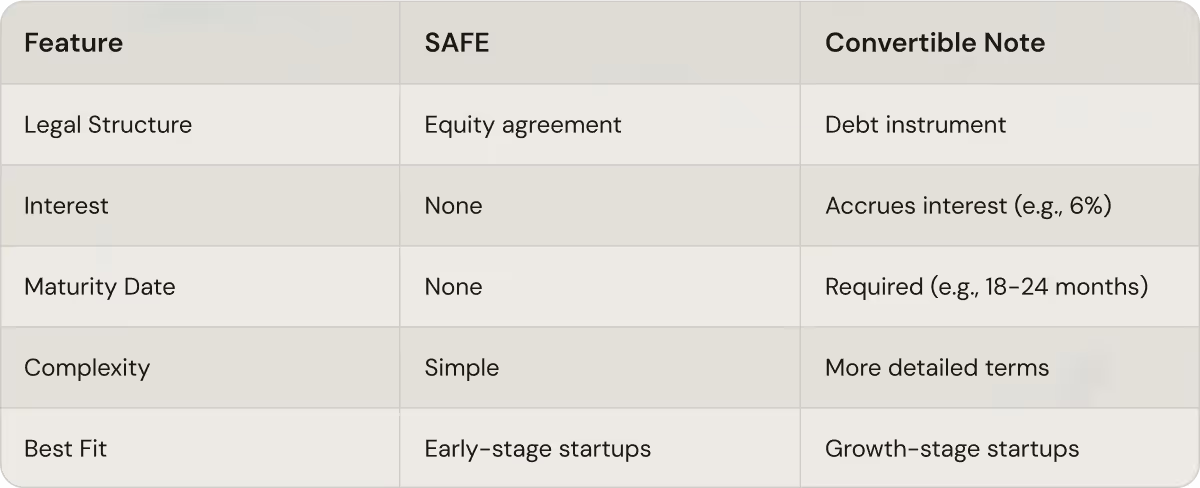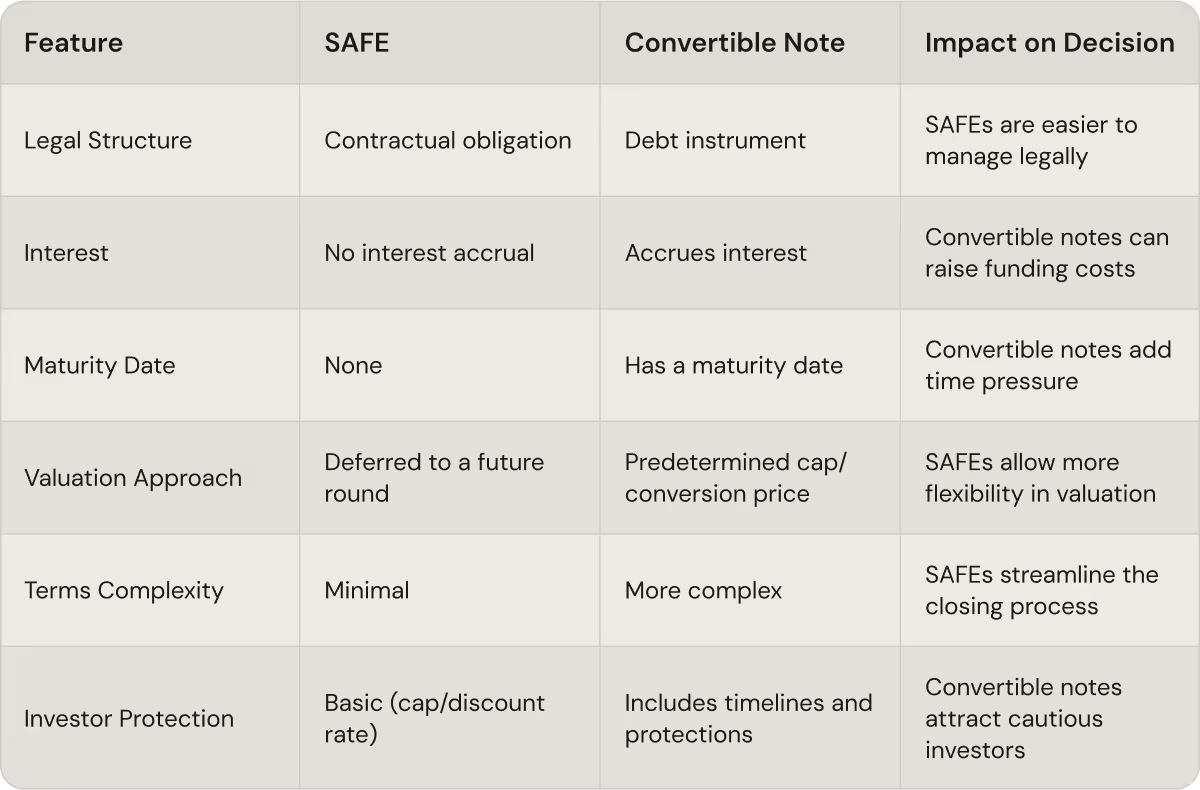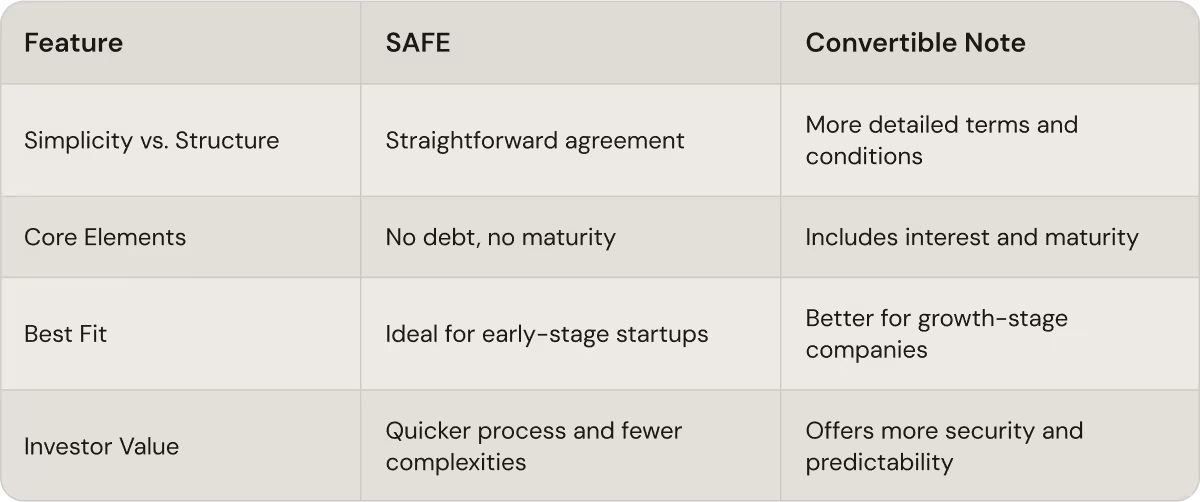Deciding between SAFEs and convertible notes for your startup? Learn the key differences and how to choose the right funding option for your growth stage.
- SAFEs: Simple agreements that convert to equity in the future. No interest, no maturity date, and minimal legal complexity. Ideal for early-stage startups needing fast, flexible funding.
- Convertible Notes: Short-term loans that convert to equity later. They include interest, a maturity date, and offer more investor protections. Best for startups with traction or investors who prefer structured terms.
Quick Comparison

Key Takeaway: Choose SAFEs for simplicity and speed. Opt for convertible notes if you need structured terms and investor protections.
Core Features
How SAFEs Work
SAFEs (Simple Agreements for Future Equity) are a straightforward way for early-stage startups to secure funding. When an investor puts money into a startup through a SAFE, they gain the right to future equity without receiving stock immediately. Since SAFEs aren't loans, they don't come with repayment obligations or the complexities of debt.
Here are the main elements of a SAFE:
- Conversion Rights: The investment converts to equity automatically during the next qualified financing round.
- Valuation Terms: SAFEs often include a valuation cap or a discount rate.
- No Interest or Maturity: Unlike loans, SAFEs don't accrue interest or have a set maturity date.
Y Combinator introduced a standard SAFE template in 2013, which has become widely used. This template has made SAFEs a popular choice for startups that want to postpone discussions about valuation.
Next, let's look at how convertible notes differ and the ways they offer added protections for investors.
How Convertible Notes Work
Convertible notes are loans that turn into equity once specific milestones or funding events occur. They blend features of debt and equity, offering both flexibility for startups and security for investors.
Key characteristics of convertible notes include:
- Interest Accrual: Interest, usually around 6% per year, accumulates until the note converts to equity.
- Maturity Date: Events like a future funding round initiate the conversion of debt into equity.
- Investor Protections: Features such as accrued interest and fixed maturity dates provide a safety net for investors.
Here's an example of typical convertible note terms:
- Interest rate: 6% annually
- Discount rate: 20%
- Conversion trigger: Automatic conversion after raising $1 million
The table below highlights how these features impact startups and investors:

Startups should aim to secure additional funding at least six months before the note's maturity to ensure a smooth conversion or renegotiation process.
SAFE vs Convertible Notes vs KISS
Direct Comparison
The main distinction lies in their legal structure: SAFEs simplify agreements, while convertible notes function more like debt with added terms. Here's a breakdown of how each option serves different startup goals.
These tools influence funding by varying investor rights, valuation methods, and timelines. Below is a practical comparison:

SAFEs focus on simplicity, centering around valuation caps and discounts. In contrast, convertible notes include additional elements like interest rates, maturity dates, and conversion triggers, offering more investor safeguards.
For early-stage startups, SAFEs are often a better fit. They avoid interest payments and maturity deadlines, giving founders more room to concentrate on growth. On the other hand, convertible notes cater to investors who prefer defined terms and clear exit strategies, thanks to their debt-like features and built-in protections.
Choosing Between Options
When SAFEs Make Sense
SAFEs are particularly useful for early-stage startups that need a simple and straightforward way to raise funds. They are ideal for:
- Pre-revenue startups: If your company isn't generating steady revenue yet, SAFEs let you delay valuation discussions until you have more solid performance data.
- Accelerator programs: Many accelerators prefer SAFEs because they avoid interest accrual and maturity dates, letting founders focus on building their product and testing the market.
- Urgent fundraising: With minimal legal hurdles, SAFEs can be finalized quickly - sometimes in just a few days.
In contrast, convertible notes are better suited for situations where more formal terms and investor protections are a priority.
When Convertible Notes Are a Better Fit
Convertible notes are a better option when your startup or investors need more structure and defined terms. They work well for:
- Growth-stage startups: If your business has a proven revenue stream, convertible notes provide clarity with valuation caps and other structured terms.
- Building strong investor relationships: Experienced investors often prefer the added security of convertible notes, which include features like interest accrual, maturity dates, and detailed conversion terms. They may also include provisions for board representation or voting rights.

Choosing the right option depends on your startup's stage and what your investors are looking for. Each approach has its strengths based on your specific needs and goals.
Effects on Business
Cap Table Effects
SAFEs and convertible notes impact cap tables differently, especially when it comes to dilution and ownership clarity.

These differences often influence how investors view each option.
Investor Considerations
Investor preferences for SAFEs or convertible notes often depend on their goals and risk tolerance:
- Convertible notes are favored by:
- Venture capital firms with traditional approaches
- Investors looking for interest returns
- Later-stage angels who value clear terms
- SAFEs are popular among:
- Early-stage angel investors
- Accelerator programs
- Investors who prioritize simplicity in agreements
Each option also comes with distinct legal and tax considerations.
Legal and Tax Impact
Legal and tax implications vary significantly between SAFEs and convertible notes:
- Convertible notes allow interest deductions but require careful cash flow management.
- Interest payments from notes are taxed as ordinary income.
- SAFE holders may qualify for capital gains treatment on profits.
- SAFEs involve minimal paperwork compared to the detailed legal frameworks of convertible notes.
- Both options must comply with state securities laws.
Choosing between SAFEs and convertible notes directly affects your startup's financial structure, investor dynamics, and tax obligations. Weigh these factors carefully alongside your funding needs.
Making Your Decision
Review Your Growth Stage
The stage of your startup plays a big role in deciding which funding option makes the most sense. In Q2 2023, SAFEs accounted for 80% of pre-seed funding.

Startups in industries with longer development timelines may lean toward more structured financing options. After considering your growth stage, the next step is to factor in investor preferences.
Get Professional Input
Start preparing at least six months in advance. This gives you time to secure legal reviews, run financial models, and gather investor feedback. Before making any decisions, consult professionals to ensure your choice aligns with market conditions and your long-term goals.
While SAFEs dominate in regions like the US, they are also widely used in Canada, the Cayman Islands, and Singapore. Choose the instrument that best supports your overall strategy.
Conclusion
Main Points Summary
Deciding between SAFEs and convertible notes can shape your fundraising results. Here's a side-by-side look at their main features:

These differences highlight the strategic considerations for choosing the right option. Use this as a guide to determine which fits your startup's needs.
Next Steps
Here's what to do next:
- Evaluate your stage and funding history
- If you're a pre-seed or seed-stage startup without major funding, SAFEs might be a better fit
- If you're gaining traction and heading toward priced rounds, convertible notes could be the way to go
- Start preparing early - ideally six months ahead
- Consult with legal and financial experts
- Build financial models and review documents with professional input
- Understand what potential investors are looking for and align with their expectations.


Ready to simplify your legal operations?
Book a call with our team to learn more about how Point Legal can help your business grow with peace of mind.
You may reach us at hello@thepointlegal.com or submit the form below



